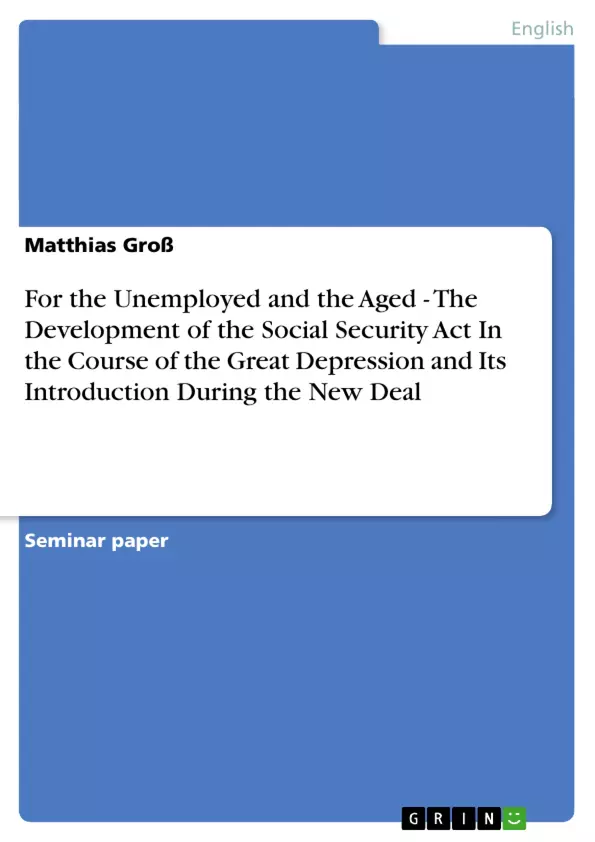The writing of this paper was initiated by a seminar on the various forms of social policy in the United States from the nineteenth century to the present day. Throughout the sessions of the seminar it became clear that the need for some public assistance has always existed in the United States. Together with three of my fellow students I prepared a presentation on the Great Depression and the introduction of Social Security during the New Deal. Doing research for our presentation in class I took notice of the enormous pressure under which the Committee on Economic Security, which became the central institution in the drafting process of the novel program, had to work and the great obstacles they had to overcome on their way to the actual passing of “their” Social Security Act in 1935.
Consequently, out of this specific encounter I attempt to discuss two main points in this paper: one is the difficulties and obstacles that needed to be overcome when the Social Security Act was first developed and the second constitutes its introduction to the American public with its particular and distinguished programs. In order to fulfill these tasks, I will start out by giving an overview of the historical background, that of the Great Depression. In this context I will also consider, for instance, public opinion or rather its change in regard to Social Security during the New Deal.
Inhaltsverzeichnis (Table of Contents)
- About this paper.
- Unemployment and abject poverty envelopes the nation.
- "The great task of furthering the security of the citizen and his family"...
- A new type of legislation takes much consideration
- "From the cradle to the grave"...
- "For the permanent well-being of the Nation as a whole".
Zielsetzung und Themenschwerpunkte (Objectives and Key Themes)
This paper examines the development of the Social Security Act in the United States during the Great Depression and its introduction during the New Deal. It focuses on the challenges and obstacles faced during the development of the Act and its subsequent introduction to the American public.
- The economic and social impact of the Great Depression.
- The evolution of public opinion towards Social Security during the New Deal.
- The challenges and obstacles faced in developing and implementing the Social Security Act.
- The key provisions and programs included in the Social Security Act.
- The impact of the Social Security Act on American society.
Zusammenfassung der Kapitel (Chapter Summaries)
- About this paper: This chapter provides an introduction to the paper's scope and objectives, outlining the focus on the development and introduction of the Social Security Act.
- Unemployment and abject poverty envelopes the nation: This chapter sets the historical context by describing the economic and social conditions of the Great Depression, highlighting the widespread unemployment and poverty that characterized this period. It discusses the failure of government intervention under President Hoover and the emergence of new relief methods under President Roosevelt.
- "The great task of furthering the security of the citizen and his family": This chapter explores the initial efforts to address the social and economic problems of the Depression. It discusses the rise of emergency relief programs and the evolving role of the federal government in providing public assistance.
Schlüsselwörter (Keywords)
This paper explores the themes of social policy, unemployment, poverty, economic depression, the New Deal, the Social Security Act, public assistance, government intervention, and the role of the federal government in providing social safety nets during times of crisis. The paper delves into the challenges and obstacles faced in developing and implementing a comprehensive social security program in the United States.
Frequently Asked Questions
What led to the creation of the Social Security Act of 1935?
The Act was a response to the massive unemployment and abject poverty caused by the Great Depression in the United States.
What was the role of the Committee on Economic Security?
This committee was the central institution responsible for drafting the novel social program under enormous political pressure.
How did public opinion change regarding social policy during the New Deal?
The crisis of the Depression shifted public opinion toward accepting a greater role for the federal government in providing a social safety net.
What were the main obstacles in passing the Act?
Obstacles included constitutional concerns, political opposition to federal intervention, and the challenge of creating a sustainable funding model.
What does "from the cradle to the grave" mean in this context?
It refers to the ambition of creating a comprehensive social welfare system that provides security for citizens throughout all stages of life.
- Citar trabajo
- Matthias Groß (Autor), 2005, For the Unemployed and the Aged - The Development of the Social Security Act In the Course of the Great Depression and Its Introduction During the New Deal, Múnich, GRIN Verlag, https://www.grin.com/document/75353



